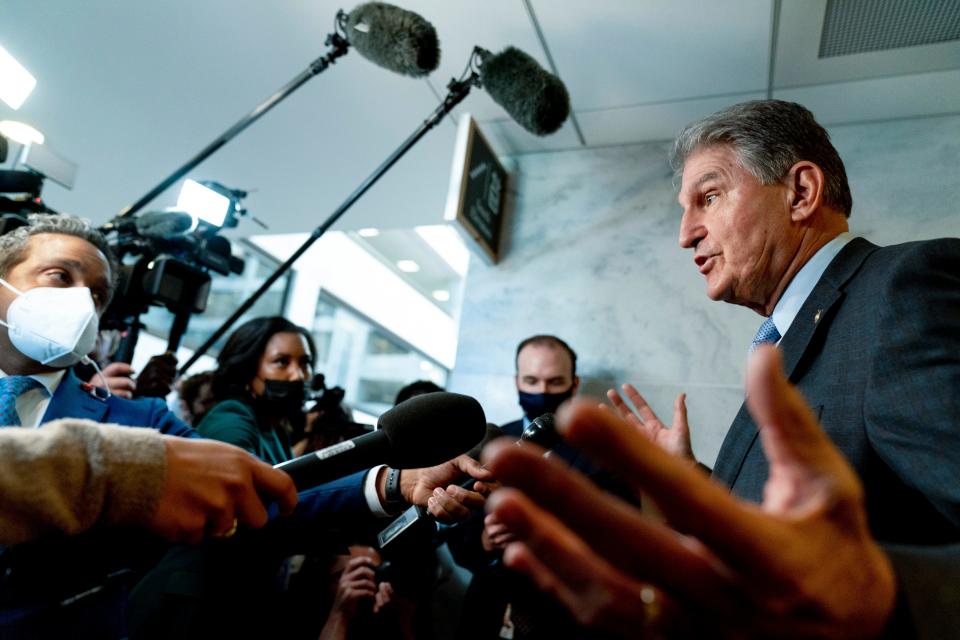Planet Earth or 14,000 coal jobs. Guess which Sen. Joe Manchin picked?
It's no stretch to conclude that Democratic Sen. Joe Manchin is risking the planet's future to protect a dwindling pool of 14,000 coal mining jobs in his home state of West Virginia.
As bad as that sounds, there are even more cynical explanations for Manchin single-handedly blocking crucial elements of President Joe Biden's climate action plan. Like money.
Manchin owns about $1 million in Enersystems shares, his son's coal brokerage firm.
And the senator raised $400,000 in campaign funds in the last quarter from oil and gas interests, even though he doesn't run for reelection until 2024.
Cutting greenhouse gas emissions
Whatever the motivations, Manchin is working hard to kill something called the Clean Electricity Performance Program (CEPP), a core element of the climate legislation embedded in Biden's massive "human infrastructure" or Build Back Better bill that Democrats are struggling to negotiate in Congress.
The legislation would be passed through a process called reconciliation that allows for simple majority approval in the Senate. That means every Democratic vote counts, and thus Manchin can play spoiler if he wants.

Biden's goal is to cut America's greenhouse gas emissions by 50 to 52% by 2030, a necessary goal if the United States and other nations hope to attain net zero emissions by mid-century to prevent catastrophic increases in global warming. Dramatic steps must come this decade, scientists say, and Biden's plan goes a long way there with a combination of electrical vehicle transition investments; reductions in methane, the worst of greenhouse gases; stepped-up agricultural and forestry carbon removal efforts; and a transformed electrical power grid.
The primary engine would be the $150 billion clean electricity program designed to use tax credits and penalties as carrots and stick to compel power companies to more rapidly shift from coal- and gas-fired plants to renewable energy.
The dirt on coal
The dirtiest of fossil fuels by far is coal – so polluting that it's already on the decline in the United States and globally.
"We need the CEPP to take on the climate crisis. It's just that simple," climate and energy police expert Leah Stokes tweeted.
Manchin is saying no.
He argues that electrical companies are already transitioning to renewable energy, so it isn't necessary to reward them for doing so. To the extent that's true, it's largely to meet new power demands. It's the hundreds of existing plants burning coal and gas that need to be replaced with renewable energy. The clean electricity program would have gradually increased pressure on power companies to make the transition.
But that isn't all Manchin wants to cut. Word surfaced Monday that he wants to excise a provision that would levee a fine on oil and gas firms that allow methane to leak from wells and pipelines, one of the six most important elements of Biden's climate plan.
Global climate summit begins Sunday
It's not impossible to fill the gaps Manchin is carving out of Biden's plan. The Rhodium Group, a nonpartisan analysis firm, argues that a patchwork of generous renewable energy tax incentives, along with tougher regulations from the Environmental Protection Agency and new restrictions by individual states, could recoup some of the lost reductions in greenhouse gases.
"We think it's doable," Rhodium's John Larsen said. But he concedes there's plenty of risk that new EPA provisions could be blocked in court or reversed by a future administration (as happened with Donald Trump), or that not enough states will follow through.
The tragedy is that Manchin seized this moment to make his stand for West Virginia's dying coal industry.
Biden's Build Back Better legislation, which once had a price tag of $3.5 trillion, is being trimmed to between $1.5 trillion to $1.9 trillion as Democrats race to produce a framework the president can show the world at a global climate summit that begins Sunday in Glasgow, Scotland.
Time is running out, and future generations may look back at an opportunity lost and blame Joe Manchin. They'd be right.
USA TODAY's editorial opinions are decided by its Editorial Board, separate from the news staff and the USA TODAY Network. Most editorials are coupled with an Opposing View, a unique USA TODAY feature.
To read more editorials, go to the Opinion front page or sign up for the daily Opinion email newsletter. To respond to this editorial, submit a comment to letters@usatoday.com.
This article originally appeared on USA TODAY: Sen. Joe Manchin risks planet Earth to save coal jobs in West Virginia

 Yahoo Movies
Yahoo Movies 